- Home
- Amelia C. Adams
A Twisted Fate Page 3
A Twisted Fate Read online
Page 3
“Good, good. And I’ll be here, watching over the situation. All the Indians, snug in their teepees . . .”
“Lodges. They only use teepees when they go on hunting expeditions.”
“And you would know, wouldn’t you?” Griffin gave him another of those smug grins. “Safe travels.”
Jesse flicked the reins and got out of there as fast as he could.
***
Harriet entered the kitchen of the Brody, a child in each arm, and handed Rose off to her mama. Elizabeth gave her daughter a cookie and then carried her down the hall to go find her papa, and Harriet sat at the table with a sigh.
“I believe this child gains a pound every day. Don’t you, Teddy?” she cooed at her chubby, gurgling baby.
Giselle laughed. “He is growing awfully fast. How are you going to keep up with him?”
“I have no idea, honestly.” Harriet chuckled. “So, I understand that you aren’t too happy about dead animals showing up on the porch.”
“That was days ago! When will I be able to live that down?”
“I haven’t been up to the main house in a few days. You have to give me a turn to tease you.”
Giselle pulled out a chair and sat down across from Harriet. “I suppose it’s only fair.”
“Of course it’s only fair.” Harriet offered Teddy her knuckle, and he chomped down and started to suck on it like he’d never had a meal in his life. “Tom said the man who brought the deer did an excellent job of skinning it.”
“I wouldn’t know. I didn’t pay any attention to that part of it.” Giselle tried not to shudder. It had taken her this long to chase away the memories—what good could possibly come from dredging it all up again?
“Tom said he learned how from the Indians. His aunt or something.”
Giselle’s eyes flew to Harriet’s. “Indians?”
“That’s right.” Harriet was studying her carefully. “And I also heard that you’re planning to take a walk with him next week.”
Giselle shook her head with exasperation. “For someone who hasn’t come up to the main house for a few days, you sure know a lot about what’s going on.”
“I have my ways.” Harriet paused. “I just thought you ought to know about the Indian connection because finding something out like that can’t be easy. Tom said he didn’t look like an Indian at all.”
“No, he has auburn hair, and his name is Scottish. Jesse McVey.”
Harriet nodded. “Then it would be all the more confusing. I . . . Listen, Giselle. I know you’ve just met this man and it’s likely that nothing will come from it aside from a pleasant walk—he’s a hunter, and hunters have to follow the herds. But I felt I should speak with you anyway.”
“About him being an Indian? Or having Indian connections?”
“That’s right.” Again, Harriet looked at her closely. “How do you feel about that?”
“I don’t know.” Giselle glanced at the clock over the kitchen fireplace. They only had twenty minutes until the next train and she knew she should be helping get ready, but her mind was all in a muddle. Mr. McVey was part Indian or something? How did she feel about that?
“I haven’t lived in this part of the country very long,” Harriet continued. “I lived in Georgia until last year, and I’d never seen an Indian before that. But I do know something about differences in race, and I know they can be brutal.”
Giselle nodded. She’d heard that Harriet’s first love was the son of a slave on her father’s plantation, and he’d been killed for daring to have feelings for her. “I don’t have attachment to him,” she said. “I just met him. And you’re right—this most likely won’t be anything more than an evening stroll and I’ll never see him again. If he even shows up on Saturday night—chances are, he’s forgotten all about it by now.”
“If it does go further than that, and if you need someone to talk to, I’ll be here,” Harriet said. “I encourage you to be careful because this world is a hateful place when it comes to people of different races, but I also wanted you to know that I have been down a similar road.” Teddy started to cry in earnest, and she lifted him to her shoulder. “Well, that’s my cue to go, and you’ve got a train to prepare for. Just remember what I said, Giselle, and come find me if you need me.”
“Thank you. I will.”
Elizabeth brought Rose back into the kitchen, and Harriet disappeared out to her small cottage behind the hotel to take care of the babies. In the bustle of the next meal, it was easy to put that conversation out of her mind, but as soon as the last customer left, Giselle went right back to thinking about it. Mr. McVey couldn’t be an Indian—not with his auburn hair and Scottish last name—but he was connected somehow. And that could be a dangerous thing.
***
“Well, now! Don’t you look handsome?” Auntie Coral looked up from her needlework when Jesse entered the parlor. He’d put on his newest suit and tried to tame his hair, but his curls kept going every which way and wouldn’t behave.
“Am I a little too dressed up?” he asked. “I feel like I’m going to church or something.”
“Isn’t that how a young man is supposed to look when he goes to call on a young lady? Especially when he was dripping with deer blood the first time they met?” Auntie Coral shook her head much the same way as she had when he told her the story in the first place. He’d thought it would be an amusing tale. She didn’t agree.
“I can’t help but think about the first time I ever saw you,” she continued. “Looking like a little ragamuffin, no mama to mend your clothes. And now you’re tall and respectable, going out to court a girl—it’s gone by so fast.” She lifted her needlework to wipe her eyes, but caught herself just in time and grabbed her handkerchief instead.
“I’m not going to court her,” Jesse protested. “I’m just going to get to know her a little better, that’s all.”
“Isn’t that the entire purpose of courting—to get to know someone better?” Auntie Coral fixed him with a look. “And why shouldn’t you court her?”
“She doesn’t know anything about my situation,” he said, leaning against the doorframe. “She doesn’t know who I really am.”
“It won’t matter to the right girl.” Auntie Coral took another stitch and pulled the thread tight. “She’ll love you for who you are.”
“I think it’s going to matter very much regardless of who the girl is,” Jesse replied. “There are so many tribes in this area of the country, tribes who have vowed to kill each other and some that would just as soon do away with the white men altogether. She can’t be expected to accept who I am without asking questions, and it’s only natural that she’d be concerned and even scared.”
“I suppose you’re right.” Auntie Coral took another stitch. “But she should be given every chance to make that decision for herself. You can’t be making up her mind for her.”
“I won’t. If there’s anything I’ve learned from you, it’s that women have minds of their own.” He thought about Posy briefly. He’d hated riding away and leaving her to face her tough dilemma alone, but he’d been hired to help Mr. Greer build some fences along his north property line, and he’d had to get back to town. He’d take off again as soon as he could and see what he could do to help Posy. It took him about ten hours to get there if he pushed his horse.
Auntie Coral smiled. “You’ll be all right. Just mind your manners and do me proud.”
“I always try.” He gave her a kiss on the cheek and then headed out. The Brody Hotel was on the opposite side of Topeka from Auntie Coral’s house, and he figured he could walk that distance in half an hour or so. That should put him there right on time.
Chapter Five
“I smell like chicken fat.” Giselle kept scrubbing her hands in the kitchen basin, but no matter what she did, she couldn’t get rid of the aroma. Sarah handed her a new bar of lye soap and she worked up a good lather, but it was just a wasted effort.
“Maybe after you change your dress,�
�� Ruth suggested.
“Maybe, but he’s going to be here any minute.” Giselle rinsed her hands and then dashed through the hall and up the stairs, hoping Mr. McVey would be late. She had been helping in the kitchen and went to pick up a bowl with chicken fat in it, and it spilled all over the table and the floor. She’d gotten down on her hands and knees to clean it up, and now the kitchen was spotless and she was a mess.
“What’s the matter?” Carrie asked, putting her book down as Giselle entered the room at a run.
“Mr. McVey is coming, and I smell like chicken fat,” Giselle answered as she fumbled with the buttons on her dress.
“I can’t smell anything,” Carrie replied.
At the same moment, Nora said, “Oh, dear. Yes, you do.”
“I’ve washed and washed, and I can’t get it off,” Giselle said. “I should probably cancel.”
“You can’t cancel.” Carrie grabbed a small bottle of perfume off the table by her bed. “Use a few drops of this, and it will mask the smell.”
“Oh, I don’t know if I could,” Giselle said. “It looks expensive.”
Carrie shrugged. “I can’t think of a single better use for it.”
Giselle hated to take something that was obviously important to the girl, but she didn’t have time to argue about it. “All right—as soon as I’ve changed. Thank you.”
She chose her white-and-yellow muslin dress, glad for a change from her darker work clothing, then tried to wash one more time in the basin in the corner. All that did was waste five minutes. She smoothed her hair, allowed Carrie to dab some perfume on her, and dashed for the stairs just as Mr. McVey entered the lobby.
He turned and watched her as she descended the stairs. She tried to look graceful, letting her fingers trail along the railing and looking down at him with a slight smile on her face, but her heart was pounding from all her running around—and from the fact that he looked very handsome in that suit.
“Good evening, Miss Hardy,” he said as she reached the first floor.
“Hello, Mr. McVey.” Oh, gracious—her voice sounded as breathless as she felt. That’s what she got for running up and down two flights of stairs.
“I hope you don’t mind, but I brought you a small gift.” He held out a bunch of pansies, and she smiled.
“I love pansies.”
“I do too. And they’re best this time of year, before the weather gets too hot. They’ll die in a Kansas summer. And they don’t grow wild—they have to be cultivated. They’re a hybrid, you see, and . . .” He paused, and a charming red blush came over his face. “I’m sorry. I tend to talk too much when I’m nervous.”
“That’s all right. So do I.” Giselle walked over to the sideboard and poured a glass of water from the pitcher that was kept there for their guests’ convenience, then put the pansies in the glass and set it on a shelf behind the check-in counter. “There. Now, shall we have our walk?”
“Yes, please.”
They left the hotel and began their stroll. The breeze kicked up, and Giselle caught a whiff of the perfume Carrie had let her use. It was an old-fashioned scent, perhaps something Giselle’s grandmother would have used, and she was surprised that Carrie would have chosen something like that for herself. It didn’t seem to suit the young girl at all. Oh, well. Giselle would just be grateful she had it.
“I’d like to thank you for coming out with me tonight,” Mr. McVey began. “I know we didn’t get off to the best start, and I’m glad for this chance to set things right.”
“I’m glad you came back,” Giselle replied. “I know we already apologized to each other, but this will help make it official.”
“I agree.” They took another few steps in silence, then he said, “Do you smell something odd?”
“Odd? What do you mean?”
He sniffed the air. “It’s like . . . chicken fat, but rotten flowers too.”
“Oh. Um . . .” Heat flooded her face. She was sure she’d burn her fingertips if she touched her cheeks. “That would be me.”
“You?” He turned to her, a curious look on his face.
“Yes. I dropped a bowl of chicken fat just a few minutes before you got here, and then Carrie shared some of her perfume with me. It didn’t help, did it?”
“No, I’d say it made things somewhat worse.”
“I see.” Giselle took a few more steps and then burst into laughter. “Oh, dear. I’ve made a mess of things, haven’t I?”
Mr. McVey’s eyes were also full of merriment. “As long as you stay downwind, everything will be all right.”
“I really am sorry.” Giselle wiped tears of laughter from her cheeks. “I was trying to be refined and elegant, and I smell like chicken fat . . .”
“And dead flowers . . .” he added.
Giselle leaned up against a tree they were walking past and laughed a bit more. “So much for trying to make a good impression on you,” she said when she could finally draw a deep breath. “Now I’ll just live on in your memory as that one girl who smelled like kitchen waste.”
“You might try vinegar to cut the smell. And you’ve already made quite an impression on me, Miss Hardy,” he said, resting his hand against the same tree. “A very favorable one.”
She glanced down at the ground, not quite sure what to say to that. “I wonder if I might ask you a question.”
“Of course. Anything.”
“Anything? Are you sure that’s a guarantee you want to make? You don’t even know what I’m going to say.”
He shrugged with one shoulder. “I don’t have anything to hide.”
“That’s refreshing. Most people have at least one small thing to hide.”
He scuffed the toe of his boot in the dirt. “Oh, I’m sure I have lots of embarrassing moments I’d hesitate to share, but I’d tell them all to you if you asked me.”
His brown eyes caught her again, and her heart gave a strange extra thump. “Well, I was talking to Harriet. She’s Tom White’s wife. And she said that Tom said . . .” Gracious. This was certainly getting confusing. “Is it true that you have Indians in your family?”
“Yes, it is,” he replied without hesitation. “My father’s second wife is a Kaw.”
“And your own mother . . .”
“She was Scottish, same as my father, but she died when I was young. Then my father met Martha one day while he was out exploring, and she became my stepmother. Or my aunt, as I call her out of respect. He lives with her in Indian Territory now, and they have one child together, a daughter about six years younger than I am.” He gave her a sideways look. “And in case you’re now wondering how old I am, that would be twenty-six.”
“Oh. Your sister would be my age, then,” Giselle replied. She began walking again, and Mr. McVey kept pace at her elbow. “Is it hard, living so far away from your family?”
“It is, but I go down and visit them every so often. That’s where I was this last week, actually.”
“That’s good. I haven’t seen my family since I came to the Brody. I keep thinking that I need to pay a visit, but one thing or another comes up and I put it off. I write often, though, and send home some of my wages, and they write back. It’s a rather large family, so I get a lot of letters, and it’s almost like being there.”
“And yet you sound a little wistful,” he pointed out.
“Do I? Maybe I do. My parents have always struggled to make ends meet, you see, and I know that my wages are helping them immensely. Maybe that’s why I’m hesitant to go home—I don’t want to miss a week or two of working.” She paused and then laughed. “I don’t know what it is about you, Mr. McVey, but you make me want to tell you the absolute truth about everything. And in that spirit, I need to tell you something else.”
“You’ve got me quite intrigued, Miss Hardy,” he said, a quirk in his smile.
“Well, you see, I don’t usually get sick at the sight of blood.”
He chuckled. “You’ll forgive me if I find that a little bit diffic
ult to believe.”
Her cheeks felt warm again. Had they even really stopped? “I can imagine how it must have looked, but really, I’ve helped deliver babies before. I’ve even helped out the doctor on occasion. I’m not a fainter, and I’m not nervous about things like that. Typically.”
He paused and turned to her, that merry look back in his eyes. “So why did the deer upset you so much?”
“I can’t say. It has me just as baffled as it does you.” Giselle skirted around a bush that had sent a long branch out into the road. “Whatever the reason, I’m sure I’ll be embarrassed for the rest of my life.”
“I’d like to make a proposition,” Mr. McVey said, holding out his arm in a grand gesture.
“Oh? What sort of proposition?”
“I propose that from this moment forth, we both simply forget about it. Continuing to dredge it up will only cause you further embarrassment, and there’s no need for it whatsoever. It never happened—I wave it out of existence. Furthermore, I propose that you call me Jesse.”
She smiled. “You have the power to wave things out of existence?”
“I do. Are you impressed?”
“Very.” She pasted her most impressed look on her face. “All right, Jesse, what other powers do you have?”
“Did you know that it’s because of me that the sun rises and sets every day?”
“Is it now? And how did it manage it before you were born?”
He affected a crestfallen look. “You weren’t supposed to think of that. I admit it—I’m an ordinary human being. Tonight, however, I feel rather extraordinary because I get to spend this time with you.”
“That’s a very kind thing to say. So, tell me. You live here in town, but I’ve never seen you come into the hotel before.”
“Yes, I’ve lived here my whole life, but I’ve never had a reason to visit the hotel. And I’m on the other side of town, so I haven’t passed by—the closest I’ve come is the general store.”
“Do you have a house, then?”
“Actually, I stay with a very kind woman who took me in when I was a child.” Jesse told her the story of his school years, the bullying, and the woman who had helped him bridge the gap between the Indian world and the white man’s world. “I owe Auntie Coral a great deal,” he finished by saying.

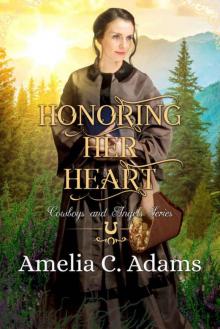 Honoring Her Heart
Honoring Her Heart Buttons and Bows
Buttons and Bows An Agent for Emily
An Agent for Emily Christmas Catch-Up VIII (River's End Ranch)
Christmas Catch-Up VIII (River's End Ranch)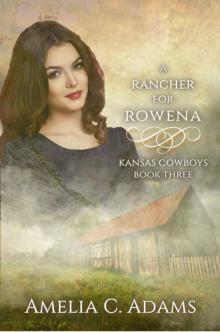 A Rancher for Rowena
A Rancher for Rowena Candice (Seven Sisters Book 6)
Candice (Seven Sisters Book 6) Butterfly Kisses
Butterfly Kisses A Stitch in Time
A Stitch in Time Buttons and Bows (The Sewing Circle Book 3)
Buttons and Bows (The Sewing Circle Book 3) Sidearms and Songbirds (Hearts of Nashville Book 3)
Sidearms and Songbirds (Hearts of Nashville Book 3) Herd to Breathe
Herd to Breathe The Ties That Bind
The Ties That Bind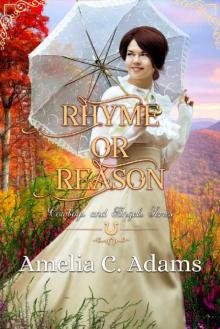 Rhyme or Reason
Rhyme or Reason Revelations (Brody Hotel Book 4)
Revelations (Brody Hotel Book 4) Phoebe's Fate (Burnt River Contemporary Western Romance Book 9)
Phoebe's Fate (Burnt River Contemporary Western Romance Book 9) And Something Blue (Main Street Merchants Book 1)
And Something Blue (Main Street Merchants Book 1)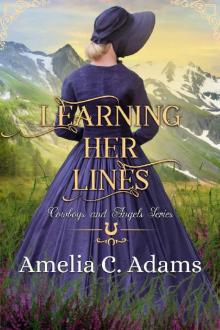 Learning Her Lines
Learning Her Lines Connections
Connections The Turn of a Wheel (Kansas Crossroads Book 17)
The Turn of a Wheel (Kansas Crossroads Book 17) Just Desserts (Main Street Merchants Book 4)
Just Desserts (Main Street Merchants Book 4) An Agent for Anna
An Agent for Anna An Agent for Esme
An Agent for Esme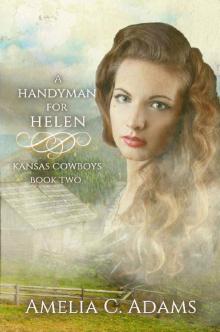 A Handyman for Helen
A Handyman for Helen Scented Sensibility
Scented Sensibility Addie's Adventurer
Addie's Adventurer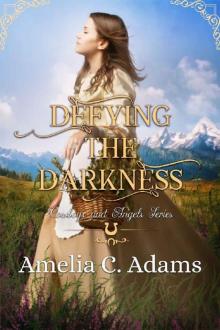 Defying the Darkness
Defying the Darkness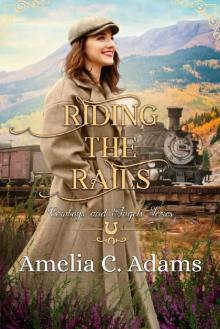 Riding the Rails
Riding the Rails Sugar And Spice (Main Street Merchants Book 7)
Sugar And Spice (Main Street Merchants Book 7) An Agent for Cynthia
An Agent for Cynthia In The Stars (Main Street Merchants Book 6)
In The Stars (Main Street Merchants Book 6)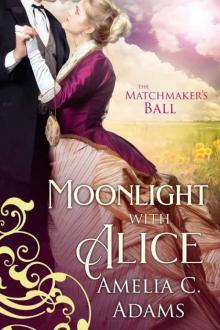 Moonlight With Alice (The Matchmaker's Ball Book 3)
Moonlight With Alice (The Matchmaker's Ball Book 3) Five Golden Rings (Main Street Merchants Book 3)
Five Golden Rings (Main Street Merchants Book 3)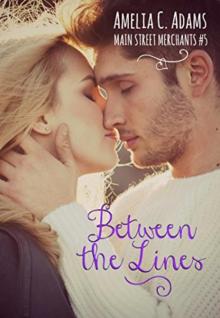 Between The Lines (Main Street Merchants Book 5)
Between The Lines (Main Street Merchants Book 5)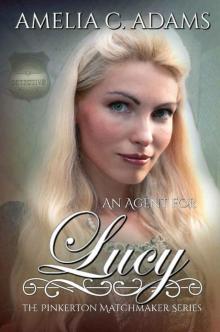 An Agent for Lucy
An Agent for Lucy Jessica (Seven Sisters Book 2)
Jessica (Seven Sisters Book 2)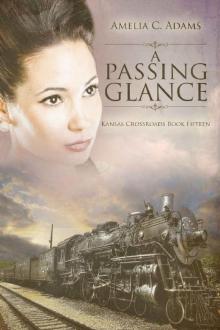 A Passing Glance
A Passing Glance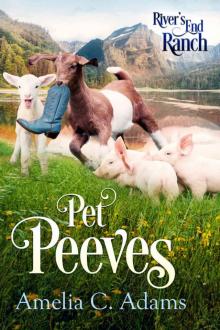 Pet Peeves
Pet Peeves RNWMP: Bride for Joel
RNWMP: Bride for Joel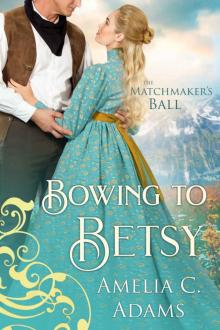 Bowing to Betsy (The Matchmaker's Ball Book 11)
Bowing to Betsy (The Matchmaker's Ball Book 11) Rebekah (Seven Sisters Book 4)
Rebekah (Seven Sisters Book 4) A Joyful Noise (Kansas Crossroads Book 14)
A Joyful Noise (Kansas Crossroads Book 14) Her Second Chance Hometown Groom
Her Second Chance Hometown Groom A Christmas Promise (Kansas Crossroads Book 16)
A Christmas Promise (Kansas Crossroads Book 16)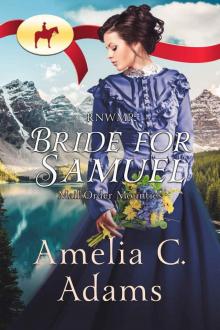 Bride for Samuel
Bride for Samuel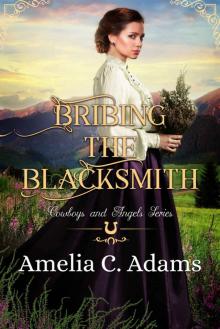 Bribing the Blacksmith (Cowboys and Angels Book 9)
Bribing the Blacksmith (Cowboys and Angels Book 9)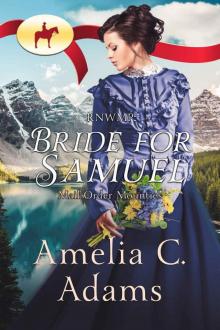 RNWMP: Bride for Samuel (Mail Order Mounties Book 12)
RNWMP: Bride for Samuel (Mail Order Mounties Book 12) Tea for Two
Tea for Two The Bitter and the Sweet (Kansas Crossroads Book 9)
The Bitter and the Sweet (Kansas Crossroads Book 9) Frank (Seven Sons Book 6)
Frank (Seven Sons Book 6) A Cattleman for Cora
A Cattleman for Cora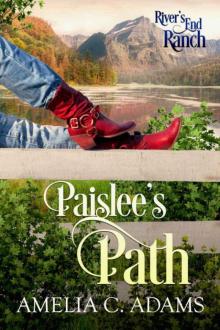 Paislee's Path (River's End Ranch Book 48)
Paislee's Path (River's End Ranch Book 48) Accidental Agent (River's End Ranch Book 3)
Accidental Agent (River's End Ranch Book 3)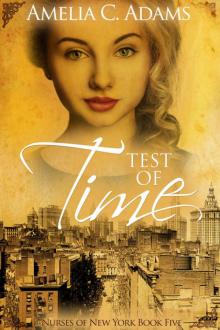 Test of Time (Nurses of New York Book 5)
Test of Time (Nurses of New York Book 5)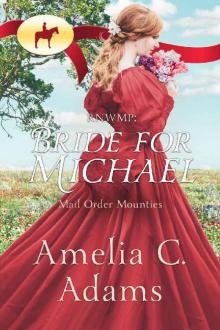 RNWMP: Bride for Michael (Mail Order Mounties Book 24)
RNWMP: Bride for Michael (Mail Order Mounties Book 24) Loving the Landlord
Loving the Landlord The Dark and the Dawn (Kansas Crossroads Book 3)
The Dark and the Dawn (Kansas Crossroads Book 3) Candy Crush
Candy Crush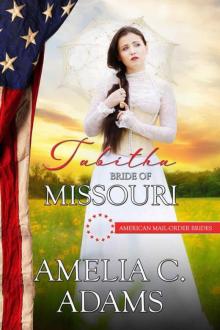 Tabitha: Bride of Missouri (American Mail-Order Bride 24)
Tabitha: Bride of Missouri (American Mail-Order Bride 24)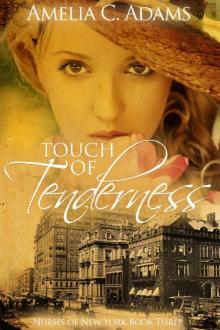 Touch of Tenderness (Nurses of New York Book 3)
Touch of Tenderness (Nurses of New York Book 3) Lucky Lifeguard (River's End Ranch Book 28)
Lucky Lifeguard (River's End Ranch Book 28) Heartstrings (Brody Hotel Book 2)
Heartstrings (Brody Hotel Book 2) Heart of Hearts (Nurses of New York Book 4)
Heart of Hearts (Nurses of New York Book 4)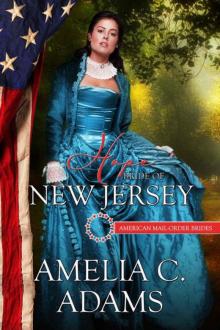 Hope_Bride of New Jersey
Hope_Bride of New Jersey A Careless Wind (Kansas Crossroads Book 7)
A Careless Wind (Kansas Crossroads Book 7) An Agent for Emily (The Pinkerton Matchmaker Book 28)
An Agent for Emily (The Pinkerton Matchmaker Book 28)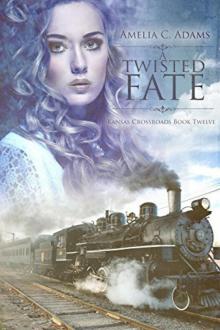 A Twisted Fate
A Twisted Fate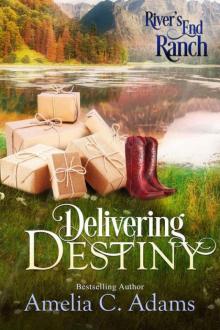 Delivering Destiny (River's End Ranch Book 23)
Delivering Destiny (River's End Ranch Book 23)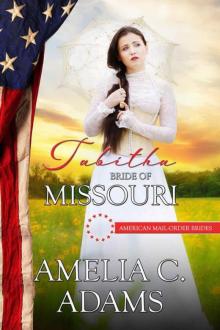 Tabitha_Bride of Missouri
Tabitha_Bride of Missouri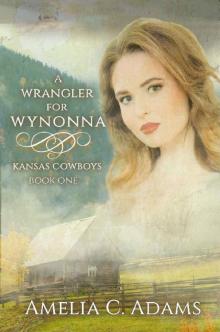 A Wrangler for Wynonna
A Wrangler for Wynonna RNWMP_Bride for Peter
RNWMP_Bride for Peter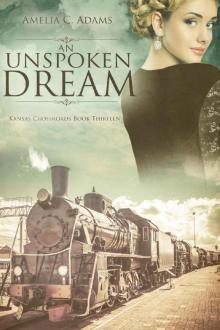 An Unspoken Dream (Kansas Crossroads Book 13)
An Unspoken Dream (Kansas Crossroads Book 13) Generations
Generations Utah Sunrise (Rocky Mountain Romances Book 1)
Utah Sunrise (Rocky Mountain Romances Book 1)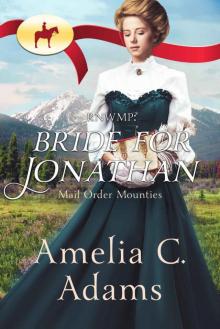 Bride for Jonathan
Bride for Jonathan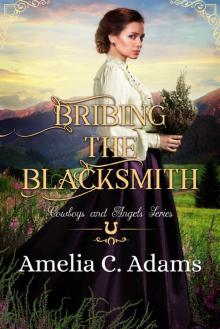 Bribing the Blacksmith
Bribing the Blacksmith A Clean Slate (Kansas Crossroads Book 4)
A Clean Slate (Kansas Crossroads Book 4)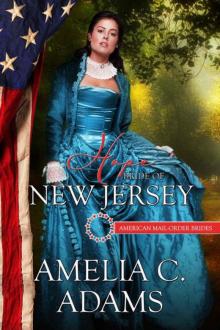 Hope: Bride of New Jersey (American Mail-Order Brides 3)
Hope: Bride of New Jersey (American Mail-Order Brides 3) Rugged Rockclimber (River's End Ranch Book 8)
Rugged Rockclimber (River's End Ranch Book 8)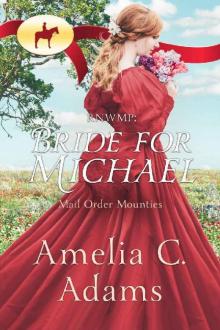 RNWMP_Bride for Michael
RNWMP_Bride for Michael RNWMP: Bride for Joel (Mail Order Mounties Book 4)
RNWMP: Bride for Joel (Mail Order Mounties Book 4) Tea For Two (Cowboys & Angels Book 15)
Tea For Two (Cowboys & Angels Book 15)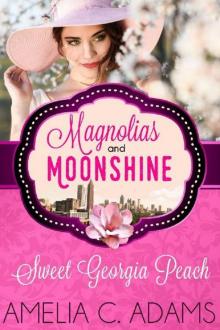 Sweet Georgia Peach
Sweet Georgia Peach RNWMP: Bride for Peter (Mail Order Mounties Book 20)
RNWMP: Bride for Peter (Mail Order Mounties Book 20) A Clear Hope (Kansas Crossroads Book 5)
A Clear Hope (Kansas Crossroads Book 5)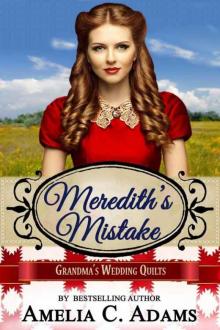 Meredith's Mistake (Grandma's Wedding Quilts Book 4)
Meredith's Mistake (Grandma's Wedding Quilts Book 4)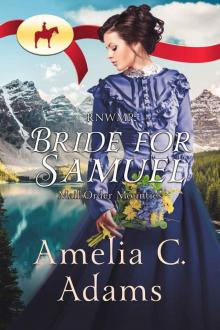 RNWMP_Bride for Samuel
RNWMP_Bride for Samuel The Whisper of Morning (Kansas Crossroads Book 6)
The Whisper of Morning (Kansas Crossroads Book 6)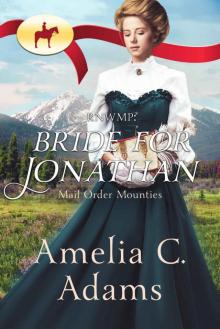 RNWMP: Bride for Jonathan (Mail Order Mounties Book 8)
RNWMP: Bride for Jonathan (Mail Order Mounties Book 8) Santa's Shopkeeper (River's End Ranch Book 18)
Santa's Shopkeeper (River's End Ranch Book 18)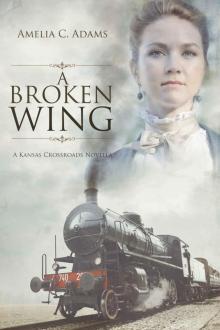 A Broken Wing (Kansas Crossroads)
A Broken Wing (Kansas Crossroads)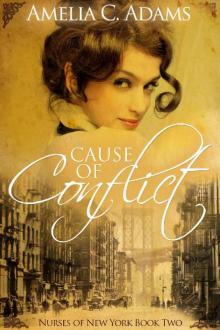 Cause of Conflict (Nurses of New York Book 2)
Cause of Conflict (Nurses of New York Book 2)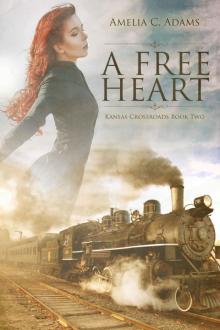 A Free Heart
A Free Heart A New Beginning
A New Beginning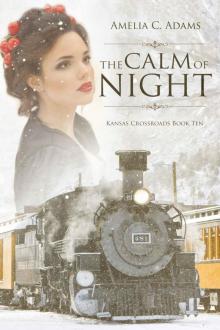 The Calm of Night (Kansas Crossroads Book 10)
The Calm of Night (Kansas Crossroads Book 10)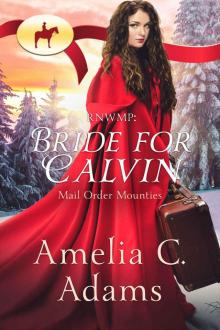 Bride for Calvin
Bride for Calvin Sea of Strangers (Nurses of New York Book 1)
Sea of Strangers (Nurses of New York Book 1)